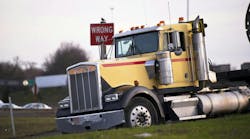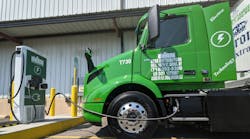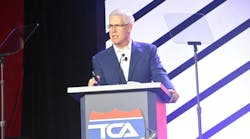Is 80,000 lbs. heavy enough for trucks or should they be allowed to be weigh more? Two competing proposals have been introduced in the U.S. Senate regarding whether the current maximum truck weight limit should be altered or kept in place.
A bill co-sponsored by Sen. Frank R. Lautenberg (D-NJ) and Sen. Claire McCaskill (D-MO) seeks to maintain the current limit of 80,000 lbs. for trucks on Interstate highways and establish a maximum length of 53 ft. for trailers.
The bill would freeze weight limits for the entire 160,000-mile National Highway System, but allow exemptions such as for firefighting equipment. According to Sen. Lautenberg, bigger trucks present additional safety risks, including longer stopping distances and greater risks of rollover and swaying into adjacent lanes.
“Last year’s tragic bridge collapse in Minneapolis demonstrated how fragile our already-deficient bridges and roads are, and we should not be putting even heavier trucks on them,” Lautenberg said. “But that is exactly what some trucking company interests are proposing-- even bigger and heavier trucks on our roads. If there was ever a recipe for disaster, this is it. Our bill would protect our infrastructure and improve safety on our roads by helping keep dangerously large and heavy tractor-trailer trucks off of them.”
“There are safety considerations along with the reality of increased fuel costs that require us to say no to even bigger commercial trucks on our roads,” McCaskill said.
However, the Commercial Truck Fuel Savings Demonstration Act of 2008, co-sponsored by Sen. Susan Collins (R-ME) and Sen. Olympia Snowe (R-ME), proposes a two-year pilot program that would allow trucks carrying up to 100,000 lbs. to travel on the Interstate highway system when diesel prices surpass an average of $3.50 per gallon.
According to Collins, raising the weight limit would allow companies to put more cargo in each truck, reducing the number of trucks needed to transport goods, saving on fuel costs and limiting idling.
“Our nation faces record high energy prices, affecting almost every aspect of daily life. The rapidly growing price of diesel is putting an increasing strain on our trucking industry, which is the cornerstone of our economy,” Collins said. “Current laws that force trucks carrying more than 80,000 lbs. off the federal interstate system, and onto smaller, two-lane roads, simply do not make sense. This legislation would lessen the fuel cost burden on truckers by putting these trucks back on the federal Interstate where they belong.”
Americans for Safe and Efficient Transportation, a coalition of shippers, motor carriers and manufacturers, has called for a 97,000 lb. limit maximum. According to the group, raising the maximum weight would annually result in 25,000 fewer accidents and 450 fewer fatalities, reduce miles traveled by large trucks by 10,000,000, save 1.9 billion gallons in fuel and save up to $15 billion in shipping costs.
However, the Owner-Operator Independent Drivers Association (OOIDA) has voiced its opposition to longer and heavier trucks, saying that stability, mobility and maneuverability are reduced on larger vehicles.
“Increasing allowable vehicle weights from 80,000 lbs. to 97,000 lbs. may be described by some as a minor change, but it could have a dramatic impact on the safety and structural integrity of some federal aid highways, said OOIDA executive vp Todd Spencer. “Increases to current standards could seriously jeopardize the safety of both automobile and commercial truck drivers.”




